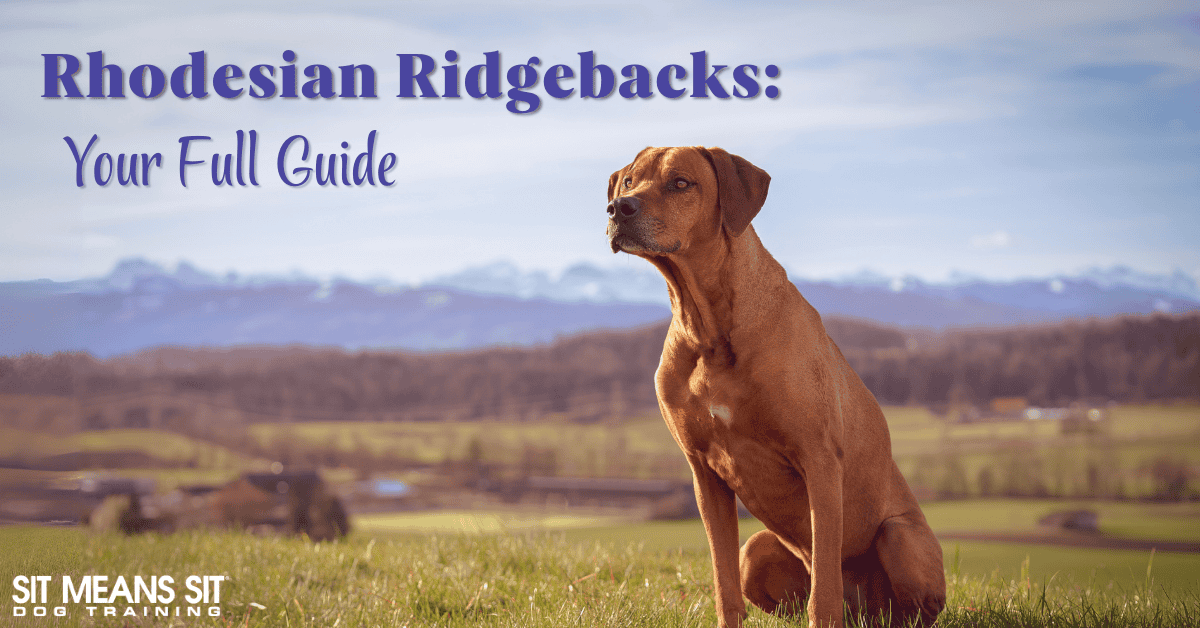History of Rhodesian Ridgebacks
The Rhodesian Ridgeback has a rich history rooted in southern Africa, where they were originally bred to be both hunting dogs and protectors. Farmers in the region developed this breed by mixing native African dogs with European breeds like Greyhounds, Mastiffs, and Bloodhounds. The result was a powerful, intelligent dog with great endurance and a strong instinct to protect.
These dogs earned the nickname “African Lion Hound” because they were used to track and hold lions at bay until hunters could step in. Their bravery, intelligence, and loyalty made them trusted companions, not just for hunting, but for guarding homes and families as well. The breed eventually made its way to other parts of the world and was officially recognized in the United States in the mid-20th century.
Caring For a Rhodesian Ridgeback
These active pups need regular exercise, mental stimulation, and grooming to stay healthy and happy. Here are the key aspects of caring for a Rhodesian Ridgeback:
Exercise and Mental Stimulation
Rhodesian Ridgebacks are energetic and need regular physical activity to stay happy. A long daily walk, jog, or hike is a must, along with time to play and explore. These dogs can get bored easily, so mental stimulation is important to prevent destructive behaviors. Activities like puzzle toys, scent games, and training sessions can all help keep their minds sharp.
Grooming Your Rhodesian Ridgeback
Despite their sleek, short coat, Ridgebacks shed a moderate amount throughout the year. Weekly brushing will help keep the loose fur under control and also keep their coat shiny. Unless your pup gets particularly dirty, this breed only needs occasional baths. Owners of this breed can usually bathe them about once a month or so, depending on their dog’s lifestyle. Be sure to check their ears regularly for dirt or signs of infection, and keep their nails trimmed.
Training and Socialization
This breed is smart and quick to learn, but also known for being independent. That means they respond best to consistent training using positive reinforcement. They can be stubborn at times, so patience is key.
Early socialization is especially important for Ridgebacks. Introducing them to different people, pets, and environments while they’re still young will help them grow into confident, well-mannered adults. While they’re naturally protective, proper socialization helps prevent them from becoming too wary of strangers.
Diet and Nutrition
Rhodesian Ridgebacks do well on a high-quality diet that supports their muscular build and active lifestyle. Most adult Ridgebacks eat two measured meals per day. Puppies, seniors, and highly active dogs may need different meal plans, so it’s best to ask your vet what’s right for your individual dog.
Because they’re a deep-chested breed, they can be at risk for bloat. Feeding smaller meals throughout the day and avoiding vigorous activity right after eating can help reduce the risk. Puzzle feeders or slow-feed bowls can also help prevent them from eating too quickly.
Common Health Issues of This Breed
Although they’re a healthy breed overall, Rhodesian Ridgebacks can be prone to certain health problems. One of the more well-known concerns is dermoid sinus, which causes a tube-like defect under the skin along the spine. Reputable breeders screen for this and typically have puppies checked early.
Other possible health issues include elbow and hip dysplasia, which can lead to joint pain and mobility issues later in life. They may also be prone to hypothyroidism, where the thyroid doesn’t produce enough hormones, leading to symptoms like weight gain and low energy. Eye problems such as cataracts or entropion can occur as well.
Personality Traits of a Rhodesian Ridgeback
Rhodesian Ridgebacks are smart, but they also have a strong independent streak. This means they may test boundaries if they don’t see a reason to follow a command. Start training early using positive reinforcement, and be consistent with your expectations. Socialization from a young age is just as important. Introducing your dog to new people, animals, and environments will help them grow into a well-adjusted adult dog. We recommend training your Rhodesian Ridgeback early on with an expert trainer like the ones at Sit Means Sit.
With plenty of exercise, consistent training, and a lot of love, Rhodesian Ridgebacks can become loyal, affectionate, and protective family members you’ll be glad to have by your side. Now that you’ve read this guide on Rhodesian Ridgebacks, you should be well-equipped to care for one or bring one into your home.
Check Out These Posts for More Dog Breed Guides!
Everything You Need to Know About the Alaskan Malamute
Everything You Need to Know About English Setters

